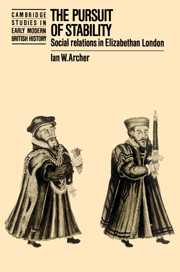Book contents
- Frontmatter
- Contents
- List of figures
- List of tables
- Acknowledgements
- List of abbreviations
- 1 INTRODUCTION: THE PROBLEM OF ORDER
- 2 THE FRAMEWORK OF SOCIAL RELATIONS: THE CITY ELITE
- 3 THE FRAMEWORK OF SOCIAL RELATIONS: LOCAL GOVERNMENT, NEIGHBOURHOOD, AND COMMUNITY
- 4 THE FRAMEWORK OF SOCIAL RELATIONS: THE LIVERY COMPANIES
- 5 SOCIAL POLICY
- 6 CRIME AND SOCIETY
- 7 CONCLUSION
- Bibliography
- Index
- Cambridge Studies in Early Modern British History
1 - INTRODUCTION: THE PROBLEM OF ORDER
Published online by Cambridge University Press: 20 October 2009
- Frontmatter
- Contents
- List of figures
- List of tables
- Acknowledgements
- List of abbreviations
- 1 INTRODUCTION: THE PROBLEM OF ORDER
- 2 THE FRAMEWORK OF SOCIAL RELATIONS: THE CITY ELITE
- 3 THE FRAMEWORK OF SOCIAL RELATIONS: LOCAL GOVERNMENT, NEIGHBOURHOOD, AND COMMUNITY
- 4 THE FRAMEWORK OF SOCIAL RELATIONS: THE LIVERY COMPANIES
- 5 SOCIAL POLICY
- 6 CRIME AND SOCIETY
- 7 CONCLUSION
- Bibliography
- Index
- Cambridge Studies in Early Modern British History
Summary
DISORDER
On the evening of Sunday 29 June 1595 a crowd of London apprentices reported to have been one thousand strong marched on Tower Hill, intending to ransack gunmakers' shops, and then stoned the City's officers who had been sent to pacify them. Their ultimate intentions are unclear, but in the legal proceedings which followed it was alleged that they planned ‘to robbe, steale, pill and spoile the welthy and well disposed inhabitaunts of the saide cytye, and to take the sworde of aucthorytye from the magistrats and governours lawfully aucthorised’. Particularly ominous were the tearing down of pillories in Cheapside and the report that a gallows had been set up outside the house of the unpopular mayor, Sir John Spencer. This disturbance was the culmination of a series of riots in the preceding months. A riot on Shrove Tuesday had not indicated that anything was seriously amiss, since this was traditionally a time of apprentice misrule. But more alarming, because so unusual in the city, had been the food riots over the price of fish and butter on 12 and 13 June. And there was mounting evidence of coordination between apprentices and a discontented soldiery. Rumours were circulating that they were conspiring to ‘play an Irish trick with the lord mayor, who should not have his head upon his shoulders within one hour after’.
- Type
- Chapter
- Information
- The Pursuit of StabilitySocial Relations in Elizabethan London, pp. 1 - 17Publisher: Cambridge University PressPrint publication year: 1991

